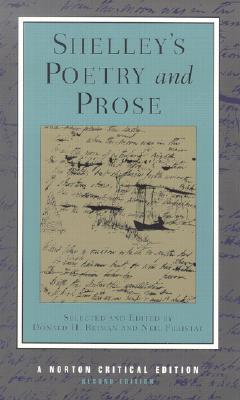What do you think?
Rate this book


786 pages, Paperback
First published January 1, 1977
The Norton Critical Edition, Shelley's Poetry and Prose, contains all of Shelley's most famous poems long and short, from briefer lyrics like "The Hymn to Intellectual Beauty," the "Ode to the West Wind," and the immortal sonnet about the evanescence of tyranny, "Ozymandias," to such longer pieces as the bloody Renaissance revenge tragedy The Cenci and the ferocious political protest "The Mask of Anarchy." I intend below to discuss only a handful of the poet's major long works. The critical materials in the back of the book chart the vicissitudes of Shelley's reception. Following his canonization by Victorian poets like Tennyson, Browning, and Swinburne, a detailed biography in the 1880s damaged his reputation with its disclosures about his personal life: his abandonment of his pregnant first wife, Harriet, who later killed herself; his elopement with the 19-year-old Mary Godwin, the daughter of radicals Mary Wollstonecraft and William Godwin; and his later estrangement from Mary amid several attractions to other women, until his untimely death by drowning in the Italy to which the young revolutionary had fled to lead a life impossible in conservative England.Read more...
The biography occasioned a famous review by Matthew Arnold, who'd already soured on the Romantics in favor of a more measured, classical view of life. Arnold's irresistibly sarcastic asides throughout the review ("Complicated relationships, as in the Theban story!" "What a set! what a world!" "one feels sickened for ever of the subject of irregular relations") prepared the way for Shelley's later dismissal by most of the modernists (except the worshipful Yeats) and their New Critical academic disciples. Shelley was only revived in the second half of the 20th century, most notably by Harold Bloom, who hailed him as an especially lyrical and urbane representative of a visionary Protestant tradition in English poetry going back to Spenser and Milton, that unruly tradition more conservative intellects like Arnold and T. S. Eliot sought to bury.